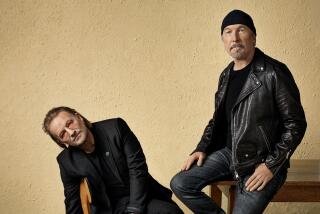Pere Ubu: Finally Shaking Off the ‘Eccentric’ Label?
- Share via
“We are this cup,” said a slightly agitated David Thomas, holding up a Styrofoam vessel to represent the perception-vs.-reality dilemma his band Pere Ubu has faced since it formed in Cleveland in the pre-punk mid-’70s.
“We did ‘The Modern Dance’ and you say, ‘Yeah, that’s Pere Ubu,’ ” he said, referring to the band’s 1978 debut album. “That’s like just looking at the bottom of the cup. The bottom’s not very pretty, no one sells it by showing the bottom, though it’s a very important part. But you’ve got to look at the cup from different perspectives.”
It’s understandable that Thomas, 35, is a bit upset over the band’s image as a quirky, eccentric, disjointed, oddball alternative to conventional pop. It is all that--but it’s also much more, and never more so than on the new “Cloudland” album, the second release since the reconstituted band ended a four-year hiatus last year.
The album--especially the four songs produced by Stephen Hague, best known for his work with the Pet Shop Boys and OMD--moves Pere Ubu into a very focused pop posture. “Breathe,” with its rich background vocals, “Why Go It Alone?” with its haunting hook, and the sing-along single “Waiting for Mary” bring Pere Ubu into a brave new pop world--without sacrificing the particulars that made the band such a unique and influential institution in the first place.
“To us, the most radical thing we could do was a pop record,” the corpulent Thomas, who now lives in London, said at PolyGram Records’ Burbank offices. “We didn’t set out to make one, but halfway through we realized we were. Then Hague came along and the die was cast.”
Even if this album were to become a pop hit, Thomas, the most visible and identifiable Ubu, may have a hard time shaking his longstanding image as a childlike eccentric. At the mention of that, he rolled his eyes with weary resignation.
“I’m not childlike or eccentric,” he said. “I’ve got both feet on the ground. But it’s always easier for writers to take the easy way out and use a stereotype rather than ask the hard questions and use the answers. Like why this group has willfully flown in the face of commercial prospects for 14 years. . . . It’s easier to say we’re eccentric or childlike.”
He does acknowledge that Pere Ubu’s music can be eccentric, even childlike. But that’s the music, not the makers.
“The medium isn’t the message,” he said. “I don’t care what anyone says.”
More to Read
The biggest entertainment stories
Get our big stories about Hollywood, film, television, music, arts, culture and more right in your inbox as soon as they publish.
You may occasionally receive promotional content from the Los Angeles Times.








